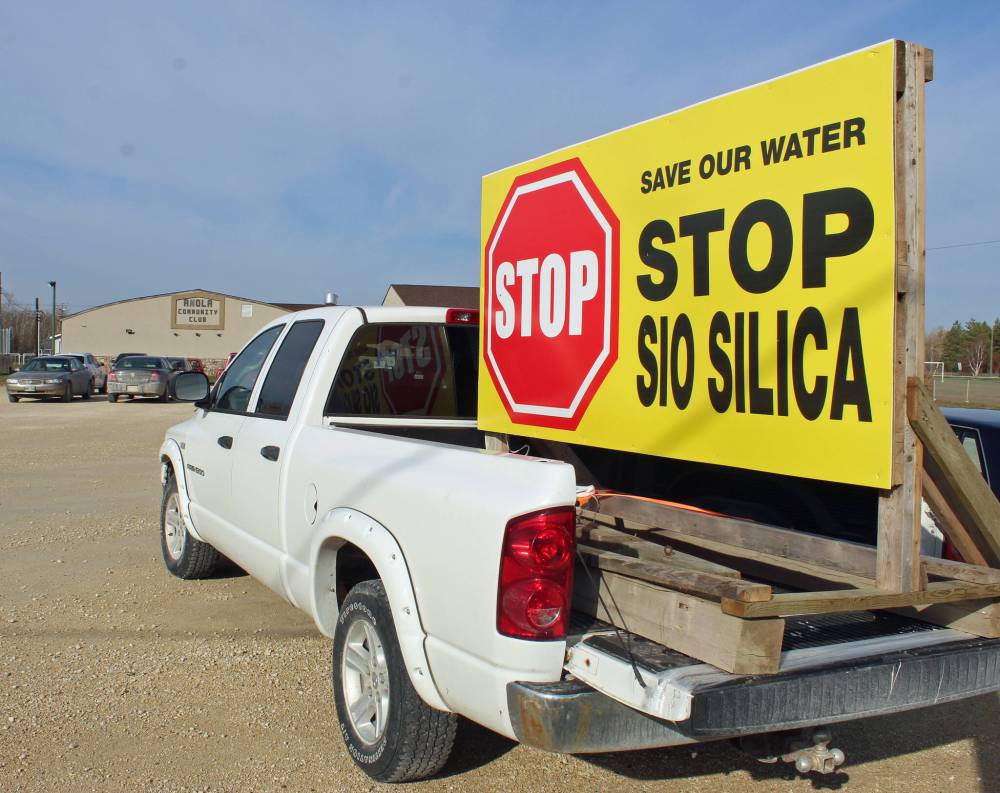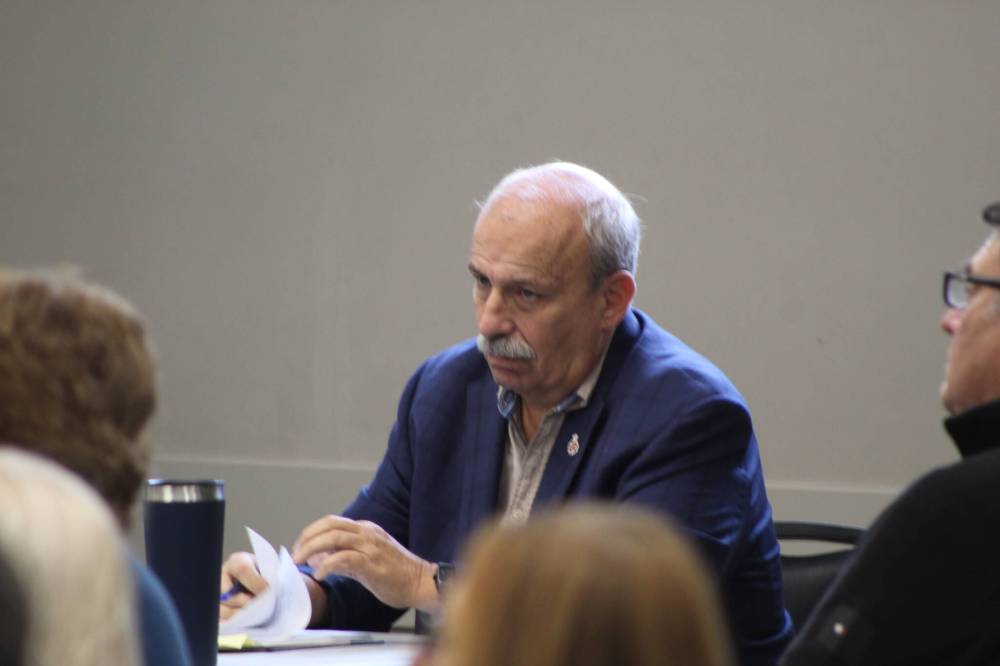Politics behind province’s decision, mining company claims
Advertisement
Read this article for free:
or
Already have an account? Log in here »
To continue reading, please subscribe:
Monthly Digital Subscription
$0 for the first 4 weeks*
- Enjoy unlimited reading on winnipegfreepress.com
- Read the E-Edition, our digital replica newspaper
- Access News Break, our award-winning app
- Play interactive puzzles
*No charge for 4 weeks then price increases to the regular rate of $19.00 plus GST every four weeks. Offer available to new and qualified returning subscribers only. Cancel any time.
Monthly Digital Subscription
$4.75/week*
- Enjoy unlimited reading on winnipegfreepress.com
- Read the E-Edition, our digital replica newspaper
- Access News Break, our award-winning app
- Play interactive puzzles
*Billed as $19 plus GST every four weeks. Cancel any time.
To continue reading, please subscribe:
Add Free Press access to your Brandon Sun subscription for only an additional
$1 for the first 4 weeks*
*Your next subscription payment will increase by $1.00 and you will be charged $16.99 plus GST for four weeks. After four weeks, your payment will increase to $23.99 plus GST every four weeks.
Read unlimited articles for free today:
or
Already have an account? Log in here »
Hey there, time traveller!
This article was published 16/02/2024 (670 days ago), so information in it may no longer be current.
Sio Silica is reviewing its legal options after the Manitoba government rejected a controversial proposed mining project — a decision the Calgary-based firm described as a “huge loss” for the province.
In a statement provided by CEO Feisal Somji, the company accused the NDP of making a decision based on politics, not science, facts or economic benefits.
“Sio remains hopeful that the government will be open to discussing solutions that are grounded in science and do not squander this multi-generational opportunity for the people of Manitoba,” the statement said.
JORDAN ROSS / THE CARILLON ARCHIVES Sio Silica claims they were blindsided by the provincial government's rejection of its application.
Sio Silica claims Environment Minister Tracy Schmidt declined meeting requests and never shared any concerns about its proposed project in southeastern Manitoba. The company said it was told the province had no more questions.
Somji declined Free Press requests for a phone interview.
Last year, Sio Silica said it had already spent more than $30 million trying to move the project forward.
Premier Wab Kinew and Schmidt said the province isn’t issuing an environmental licence for sand-extraction because the proposed methods could endanger the drinking water of thousands of Manitobans.
They said the government did its due diligence, and the decision was based on expert findings.
Sio Silica insists its project is not dangerous or unproven. It said recommendations from the Manitoba Clean Environment Commission were incorporated into its draft licence, which was thoroughly reviewed and finalized by the environmental approvals branch in September.
The company said the draft licence required a phased approach, with initial multi-well testing, rigorous data collection, a final report on the findings and a cumulative effects assessment necessary before commercial-scale extraction could begin.
“This draft licence was known to the current NDP government,” the statement said. “This staged approach would have required Sio to address any remaining environmental and technical concerns the government may have had with the commercial extraction process, before any commercial extraction actually occurred.”
In January, Somji said the project would create more than 100 direct and 250 indirect jobs, and $1.2 billion in taxes to Manitoba over 24 years.
Over that span, he predicted a total of 8,000 direct and 10,000 indirect jobs, and estimated tax contributions to Manitoba of more than $300 million annually via Sio Silica’s partnership with German solar panel manufacturer RCT Solutions.
Given Friday’s decision, RCT will take its manufacturing plant elsewhere in North America, according to Sio Silica.
The company said potential benefits to local First Nations will also be lost.
“This draft licence was known to the current NDP government … this staged approach would have required Sio to address any remaining environmental and technical concerns the government may have had with the commercial extraction process, before any commercial extraction actually occurred.”–Sio Silica statement
The project was expected to produce at least 1.3 million tonnes of silica sand per year. Pure sand is used to make solar panels, computer chips, glass and other products.
Sio Silica predicted a supply service spend of $55 million annually to operate a processing facility in Vivian, in the Rural Municipality of Springfield.
The company said it was not given advance notice of the province’s decision nor an opportunity to respond before Kinew and Schmidt held a news conference in Anola Friday morning.
The announcement was met by applause from project opponents who were in attendance.
“Sio and the general public as a whole were not notified that an announcement would be occurring (Friday), yet there were many participants in the gallery that were gathered for no other reason but to applaud this decision,” the company said. “It is interesting that some select members of the public were provided the privilege to be in attendance while the company and the majority of Manitobans were left in the dark.”
Springfield Mayor Patrick Therrien said the RM’s council did not receive an invite nor was it advised of the decision in advance.
“I’m surprised we weren’t made aware it was in our area,” he said. “I would have thought that would have been protocol for us to be invited, but that said, I’m good with the decision.”
CHRIS GAREAU / THE CARILLON ARCHIVES Springfield Mayor Patrick Therrien 
Even when environmental protections are built into projects, there’s never 100 per cent certainty that something won’t happen, said David Stangeland, professor of finance at the University of Manitoba’s Asper School of Business.
If companies or investors take a view that the NDP’s decision was political, that could push investment to other places, he said.
“I hope this is not a political decision, because if it is, that looks bad for future investment into Manitoba,” said Stangeland. “I hope it really was based on sound scientific information.”
On Wednesday, the NDP government endorsed a separate proposal — from Calgary-based Canadian Premium Sands Inc. — for a silica sand quarry near Hollow Water First Nation, and a solar glass production plant in Selkirk.
The two decisions Wednesday and Friday — one for and one against — illustrate the due diligence that is required and how not all mines are created equal, said Margot Cathcart, CEO of the provincially funded Rural Manitoba Economic Development Corp.
“I’m happy to see that due diligence is going into it,” she said.
Cathcart said the decisions show Manitoba is open for business for the “right” project, with a lens toward potential environmental impacts.
chris.kitching@freepress.mb.ca

Chris Kitching is a general assignment reporter at the Free Press. He began his newspaper career in 2001, with stops in Winnipeg, Toronto and London, England, along the way. After returning to Winnipeg, he joined the Free Press in 2021, and now covers a little bit of everything for the newspaper. Read more about Chris.
Every piece of reporting Chris produces is reviewed by an editing team before it is posted online or published in print — part of the Free Press‘s tradition, since 1872, of producing reliable independent journalism. Read more about Free Press’s history and mandate, and learn how our newsroom operates.
Our newsroom depends on a growing audience of readers to power our journalism. If you are not a paid reader, please consider becoming a subscriber.
Our newsroom depends on its audience of readers to power our journalism. Thank you for your support.













